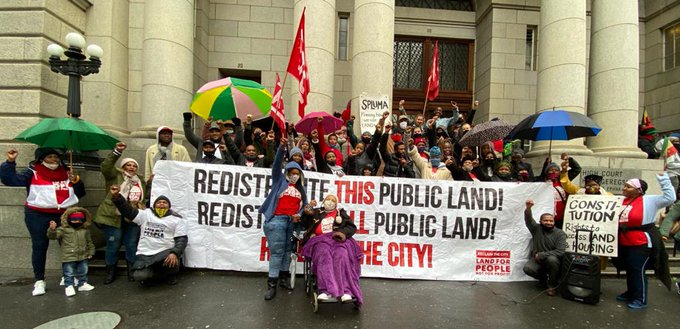It could be a huge stride against Apartheid spatial planning in Cape Town. The Western Cape High Court ruled in favour of civil society organisations Reclaim the City (RTC) and Ndifuna Ukwazi (NU) on Monday. The court set aside the Western Cape provincial government sale of the well located Tafelberg property to a private buyer. Additionally the court affirmed the province and city of Cape Town’s constitutional duty to combat spatial apartheid.
Read more on the case here:
What does the victory mean?
The judgement from the court follows years of campaigning by RTC and NU to stop the sale of the Tafelberg property. The court found that the Western Cape province and the city of Cape Town “did not have suitable policies in place to facilitate and promote access to affordable housing” and had “not taken adequate steps to address the legacy of apartheid spatial planning in central Cape Town and its surrounds”.
The judges also found that the province and city failed to comply with their obligations to advance equitable access to land and the right to housing in terms of section 25 and 26 of the Constitution. The city and province have been ordered to draw up a combined plan on how these branches of Government will jointly address the legacy of spatial inequality in central Cape Town and present that policy to the Court by no later than 31 May 2021.
In a statement, Mandisa Shandu, executive Director of Ndifuna Ukwazi, commented: “Even though this case has been four years in the making, it’s really about over 400 years of land dispossession and exclusion in Cape Town. The High Court’s decision requires the Province and City to urgently come to grips with and implement their legal duties to redress spatial inequality. This is a great victory for people who have been struggling to access land for affordable housing!”
Here’s why redressing spatial apartheid is important:
Who was the intended buyer of the site?
The Western Cape government intended to sell the Tafelberg property to the Phyllis Jowell Jewish Day school. This property is located in Sea Point. RTC and NU argued that the property was important for the process of addressing spatial apartheid in the area.
What’s been happening besides this case?
While the activists and researchers in this case have been waiting for the judgement, other developments have been taking place. Speaking to The Daily Vox Michael Clark, an NU researcher, said along with RTC, they’ve taken on a campaign on city leases – this is the leasing of city-owned land. This work has taken the form of advocacy work instead of court cases. It has involved getting public opinion around the uses of this land.
Golf course leasing
Two of the bigger cases RTC and NU have worked on together in the past year have been the Rondebosch Golf Course and King David Mowbray Golf Club. They’ve been working to get the pieces of land released for public housing. The city was criticised for its plan to renew the King David lease instead of using the land for the development of social or affordable housing. On August 24, the city confirmed that it had withdrawn the notice inviting the public to comment or plans to renew the King David Mowbray Golf Club lease.
The city also said all comments and objections received to date would be considered and placed before the council and sub council during the final decision making process.
Importance of redressing spatial apartheid
When the country was locked down to curb the spread of Covid-19, the city of Cape Town was criticised for carrying out evictions. According to the national government regulations, evictions were to be stopped during the lockdown. Cape Town’s mayor Dan Plato in response released a statement claiming that Cape Town is “under siege with illegal land invasion. Plato said the land invasions were taking away the rights of law abiding citizens.
Clark said the city is missing the point that many people are occupying the land because they have nowhere else to go. He said there is a lot of evidence that this is due to the “economic ramifications of COVID-19”.
There is a need to provide land for people but Clark said the city and province claim there is no well-located public land for housing development. With the golf leasing cases, RTC and NU are trying to prove to the city and province they have access to well-located public land, and that they “are simply not using that land” said Clark.
Where to from here?
The city, province, and other respondents in the case are likely to appeal the decision. RTC and NU are still studying the final judgment and will issue further statements once this process has been completed.









